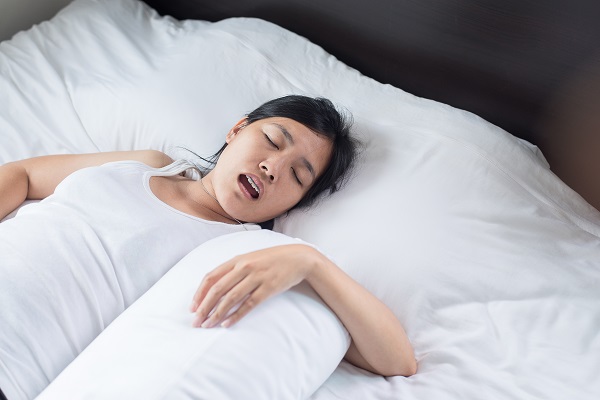How Is Sleep Apnea Treated?

Sleep apnea can lead to more serious health conditions. This sleeping disorder can cause heart disease and high blood pressure. Breathing pauses while sleeping at night can result in daytime tiredness and fatigue. Treating this disorder can improve a person’s health and well-being. If you want to know the available treatments for sleep apnea, here are the details.
Mechanical therapy
PAP or positive airway pressure therapy is the first treatment for most patients with sleep apnea. This therapy involves wearing a custom mask over the mouth or nose. A gentle air blower pushes air through the mouth or nose. The sleep doctor adjusts the air pressure. This prevents the tissues of the upper airway from collapsing while sleeping. This type of mechanical therapy has different types:
- Bi-level PAP uses lower pressure when breathing out and higher pressure when breathing in.
- CPAP or continuous positive airway pressure is the most common PAP device. It uses a single pressure.
- ASV or adaptive servo-ventilation is non-invasive ventilation that keeps the airway open, then delivers a breath when the patient needs it.
- Auto Bi-Level PAP or Auto CPAP uses different pressures that self-regulate.
Conservative treatments
Conservative treatments for sleep apnea involve lifestyle changes. Avoiding specific types of sleeping pills and alcohol can prevent the airway from collapsing during sleep. It can also lengthen the periods of apnea. Losing weight can reduce episodes of apnea with a 10% weight loss.
Changing sleeping positions can improve sleep apnea symptoms as well. Sleeping on the side is better than sleeping on the back. A wedge pillow and other sleeping appliances can support the body in a side sleeping position. Breathing strips or nasal sprays can improve airflow and reduce snoring. This results in more comfortable breathing at night.
Hypoglossal nerve stimulator
The patient will have the stimulator underneath the skin on the chest’s right side. The stimulator has electrodes connected to the intercostal muscles and the hypoglossal nerve in the neck. The device turns on at night with a remote. The patient’s breathing stimulates the hypoglossal nerve. This makes the tongue move forward and keeps the airway open.
Mandibular advancement devices
These devices are for patients suffering from mild to moderate sleep apnea. These appliances prevent the tongue from collapsing over the throat. They also move the lower jaw forward and keep the airway open as the patient sleeps. The sleep doctor and dentist will work together to determine if this is the right treatment for the patient.
Surgery
Specific procedures can also help people with obstructive sleep apnea and those who snore without apnea. Surgery is for those who have malformed or excessive tissue that obstructs the flow of air through the throat or nose. The surgery can help patients with a small lower jaw and an overbite. It can also improve the sleep of patients with large tonsils or a deviated nasal septum. Below are the common surgeries for sleep apnea:
- Maxillary or mandibular advancement surgery corrects throat blockages or specific facial abnormalities that lead to sleep apnea
- UPPP or uvulopalatopharyngoplasty increases the width of the airway by removing soft tissue at the back part of the throat
- Somnoplasty uses radiofrequency energy to reduce the soft tissue blocking the upper airway
- Tonsillectomy removes the tonsillar tissue in the back of the throat
- Nasal surgery corrects nasal obstruction
The benefits
Patients with this sleep disorder do not sleep well. Stops in breathing can happen up to 90 times during each hour of nighttime sleep. The right sleep apnea treatment results in better breathing. This then results in a better quality of sleep.
Apnea increases one’s risk of developing diabetes. Treating this sleep disorder results in better insulin resistance. It also lowers the risk of stroke and heart problems. Inadequate sleep triggers or worsens depression. Treating this disorder lowers an individual’s risk for developing depression symptoms.
Studies show that sleep apnea results in a higher risk of developing cancer. Prostate, colorectal, breast, and lung cancers emerge in men with sleep apnea. That is why it is important to get treatment right away. Talking to the sleep doctor can determine which treatment is appropriate for the patient’s needs.
Sleep apnea treatment can improve your general health and well-being
Good quality sleep is important for the body’s cell repair and growth. Any disturbance in sleep results in chaos inside your body. This results in the development and onset of various diseases, including cancer. Talking to your sleep doctor can provide you with possible treatments. Your dentist can help construct custom dental devices to help treat this sleep disorder.
Get more information about Randal S. Elloway DDS, Inc in Red Bluff at https://www.drelloway.com.
Check out what others are saying about our dental services on Yelp: Do I Have Sleep Apnea in Red Bluff, CA.
Related Posts
Sleep apnea is a serious sleep disorder that affects millions of individuals worldwide. It occurs when breathing repeatedly stops and starts during sleep, disrupting rest and potentially causing long-term health consequences. Many people are unaware that a general dentist plays a key role in diagnosing and managing sleep apnea, particularly with non-invasive treatment solutions. By…
Snoring is not the only sign of sleep apnea. It is a significant sleep condition that may have a negative impact on your health and quality of life in a short amount of time. Aside from feeling tired and drowsy throughout the day, untreated sleep apnea makes you vulnerable to different major health problems, including…
Sleep apnea is a disorder in which your breathing stops and starts periodically throughout sleep. When this occurs, your body awakens you and tells you to start breathing again. Repeated sleep disturbances make it harder to sleep properly, and you will be especially fatigued throughout the day.Sleep apnea affects you beyond daytime fatigue. Without treatment,…
If you have sleep apnea, it might at first seem like more of a nuisance for your partner than for you, especially if your primary symptom is snoring. Is it a good idea to find a solution that merely minimizes the effects on your sleeping partner — such as noise-canceling earbuds to mask the sound…


